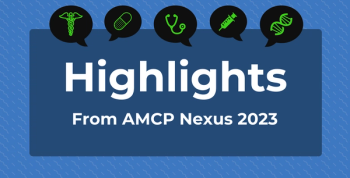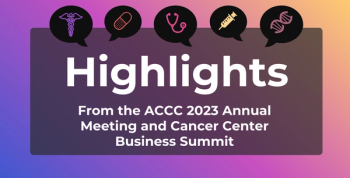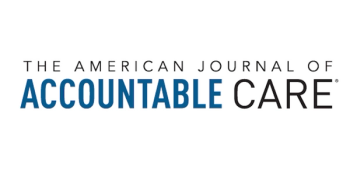
Policy
Latest News

Melinda C. Aldrich, PhD, MPH, associate professor in the departments of medicine, thoracic surgery, and biomedical informatics at Vanderbilt University, discussed recently updated lung screening guidelines from the American Cancer Society and the importance of equity across populations as new guidelines are developed.
Latest Videos

CME Content
More News

Gaps exist between self-reported and claims-based estimates of postpartum care among individuals who were covered by Medicaid for their delivery care, according to one study.

Lawmakers contemplate the return of mental health institutions in response to the drug crisis; new measures to rein in insulin prices take effect; FDA intensifies efforts to curb the teen vaping epidemic.

This year’s top content from the annual San Antonino Breast Cancer Symposium (SABCS) is concentrated in 3 areas: health equity, benign breast disease, and fertility preservation following diagnosis.

The editors in chief of The American Journal of Managed Care® discuss the managed care developments of 2023 and anticipate trends on the horizon.

At this year’s Community Oncology Alliance Payer Exchange Summit on Oncology Payment Reform, leaders from across all facets of the cancer care space engaged in thought-provoking panel discussions and debates. They have a common aim: to optimize cancer care delivery and ensure patients have a positive experience throughout their cancer care journey.

More than 15.3 million Americans enrolled in health insurance under the Affordable Care Act for 2024, which is a 33% increase from last year; emergency contraception sales in the United States may spike by around 10% in the new year; top Biden administration officials met with prominent civil rights and public health leaders on Tuesday amid the decision to delay the menthol cigarette ban.

This article examines how CMS’ adjustment for social risk factors affects the Medicare Advantage Star Ratings and the type of contracts affected by the adjustment.

From the 2023 Academy of Managed Care Pharmacy (AMCP) Nexus meeting, held in October, expert interviews and insightful updates on the Inflation Reduction Act, gene therapy affordability and access, and the 340B Drug Pricing Program comprise the conference highlights.

CDC warns of rapid spread of new COVID-19 JN.1 subvariant amidst holiday travel; drugmakers and physicians experience significant drops in reputation; HHS urges action amidst soaring drop in child enrollment for Medicaid plans.

The government of Australia’s pricing policy links the price of new medications with similar safety and efficacy, resulting in significant savings over the first 3 years after the etanercept biosimilar Brenzys was introduced.

Our most-read coverage from the Association of Community Cancer Centers (ACCC) 2023 Annual Meeting and Cancer Center Business Summit highlighted ongoing issues in oncology policy and practice.

The bipartisan bill would help lower Medicare costs and improve quality of care, according to the National Association of ACOs.

A vaccine is showing promising results in treating melanoma; the Biden administration will implement inflation penalties on dozens of drugmakers to reduce out-of-pocket costs for Medicare recipients; the CDC issued an alert urging health care providers to increase immunization coverage for influenza, COVID-19, and respiratory syncytial virus (RSV).

A new report from AHIP shows that Medicare Advantage outperformed traditional Medicare on several clinical quality measures, including preventive screenings. However, debate continues over these plans’ cost efficiency and impact on the financial sustainability of rural hospitals.

The commercial market got slightly less competitive while the Medicare Advantage market got a little more competitive, but both markets remain highly concentrated.

End-of-year victory for lawmakers as health care policies pass in the House; insurance limitations prompt concerns over access to semaglutide (Ozempic) for diabetes; a legal battle ensues over the fate of abortion laws in Arizona.

The Biden administration proposed new efforts that it says will promote competition, transparency, and affordability in the health care industry.

CDC revealed nationally representative estimates of chronic fatigue; the proposed merger between Cigna and Humana has been terminated over financial terms and shareholder skepticism; ChatGPT provides inaccurate responses to medication queries.

The Biden administration recently met with manufacturers of respiratory syncytial virus (RSV) immunizations to encourage them to increase access to the vaccine; since the Dobbs v Jackson decision, many patients have been seeking more permanent reproductive health care solutions; a Mathematica analysis showed that Medicare prescription drug price negotiations could have cut seniors’ out-of-pocket costs by nearly a quarter had the program been in effect in 2021.

Negotiations to extend US global HIV/AIDS relief work are deadlocked; the Biden administration delayed its rule on the proposed menthol cigarette ban until March 2024 after lobbying by civil rights groups; federal agencies have partnered with a digital health company to create an at-home test-to-treat program for flu and COVID-19.

Increased options and strong demand resulted in record-breaking 2024 enrollment.

Data analysis showed that 40% of patients who filled a prescription for Wegovy in 2021 or 2022 were still taking it a year later; both Democrats and reproductive rights organizations are pressuring the Biden administration to ensure health insurers fully cover contraception; CMS implemented Medicare changes in March that limited access to blood tests that help transplant recipients ensure their organs remain healthy.

Allowing nurse practitioners to serve as attribution-eligible providers for Medicare Shared Savings Program accountable care organizations leads to no change in hierarchical condition category risk scores and modest growth in attributed beneficiaries.

The sustained, collaborative effort to expand Medicaid will improve the lives of working North Carolinians who, prior to enactment, earned too much to qualify for Medicaid, but not enough to afford insurance on the marketplace.

ChatGPT is changing health care while also raising questions about artificial intelligence's promises and limitations; 24 Biden officials met with the National Organization of Black Law Enforcement Executives to discuss the FDA’s proposal to ban menthol cigarettes; a recent hospital cyberattack shows how the vulnerability of health care systems can put patients at risk.


















